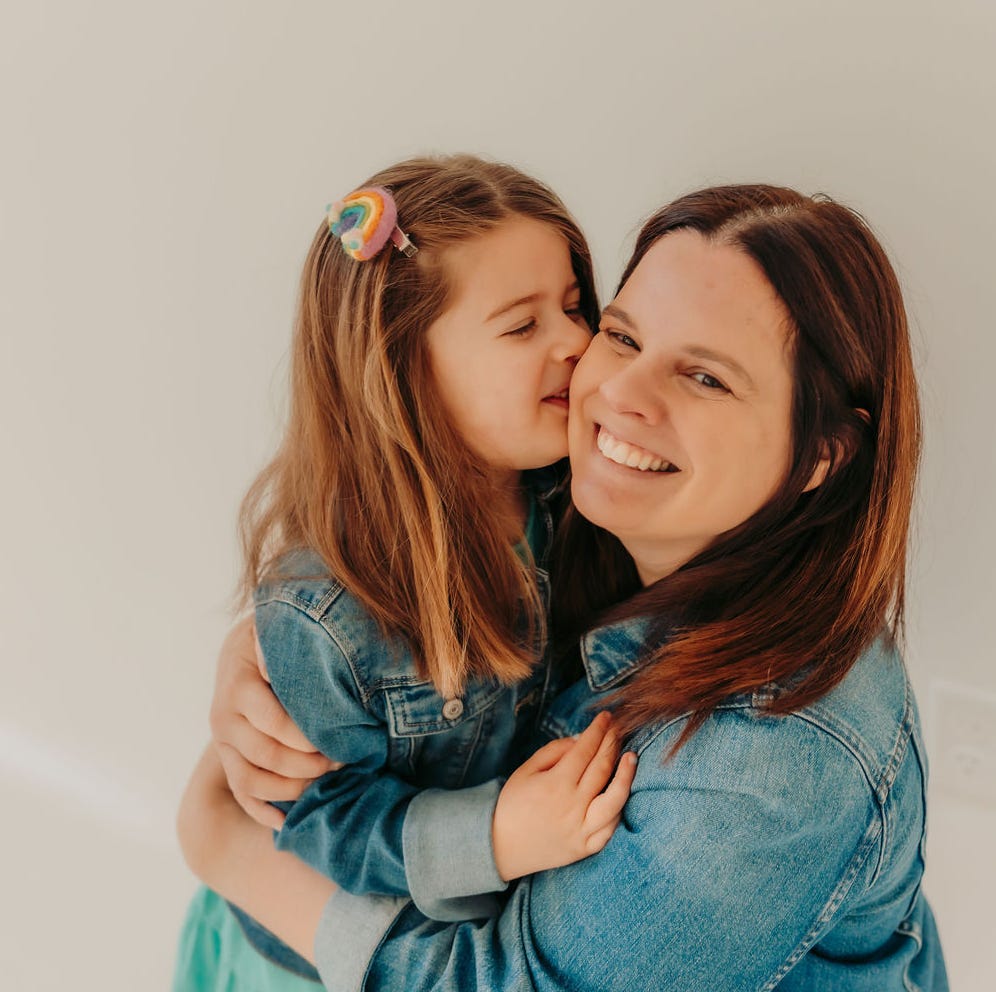Therapist Spotlight: Stacy McCann and PPD/PPA
Human/Mother welcomes Substack author of Supermom Dropout Club!
Therapist Spotlight is a series that features a mental health professional from Substack who shares insights on a rotating monthly topic for Human/Mother. The purpose of the series is to educate readers and offer guidance on how to navigate complex subjects while also doing the most important job on the planet: raising the next generation.
For its third installment, Human/Mother welcomes
to talk about this month’s topic: postpartum anxiety and depression.Thank you so much for being here, Stacy!
My immediate postpartum experience in summer 2019 was, for the most part, uneventful.
I mean, other than medical trauma during birth that ultimately landed me back in the hospital at three days postpartum. And well, then we had feeding issues, during which a lactation consultant told me I had the “triple whammy” of traumas that decreased my milk production. And of course, like many other mothers in our country, I only had a three-month, unpaid maternity leave after which I sent my infant to daycare. Then there was the pandemic. She was ten months and suddenly we were home again, trying to enjoy an extended maternity leave amidst a flurry of anxiety and unknown.
OK, so maybe it wasn’t uneventful.
The problem is that this eventful experience postpartum seems to be the new norm. I think most mothers might report a similar experience: a major medical event followed by a series of hurdles that disrupted our ability to mother, to meet our basic needs, and to heal.
Despite all of this, I never developed severe symptoms of anxiety or depression that disrupted my daily life. I had several supportive factors at-bat for me — a village ready to support me and my baby, a partner who bonded and connected with our baby from the jump, and a baby who was a natural sleeper. I had very few risk factors going into pregnancy, and I am so very grateful for that.
But my eventful postpartum, including the trajectory shift due to the pandemic, led to a realization that though my experience wasn’t abnormal, it was mild compared to what many other mothers experience and that, as a licensed mental health therapist, maybe I could help.
My name is Stacy McCann, and I’m a licensed clinical social worker and licensed behavior analyst. I spent the greater part of a decade working with families needing support through the early childhood experience. Toddlers and preschoolers were my jam, especially the ones with big feelings. But you can’t work with a three-year-old without working with their family, so the vast majority of my work was with parents.
And when I say parents, who do you think was showing up to the vast majority of appointments? You guessed it: mothers.
I worked with mothers long before I became one, but, when I did, I realized that the expectations for mothers in our modern society are impossible to meet. Motherhood is rigged — “Have it all!” “Do it all!” “Be a supermom!” But if you need help, that’s a “you” problem — and many women don’t experience this first-hand until they become pregnant.
When I had my own child followed shortly by a global pandemic, it became crystal clear who was doing all the invisible work in the background to keep a home, family, and career running. It was mothers who were reducing hours at work (or leaving the workforce all together) to be home when daycare closed due to COVID. It was mothers who spiraled with anxiety, fearing the worst every time their child coughed. It was mothers holding the grief of zoom birthday parties. And it was mothers doing the dishes and the laundry while watching daily press conferences.
So when I decided to launch my private practice, Present Moment Counseling Services, in August 2022, I wanted to practice in total support of mothers in all stages of motherhood. I did intensive training on attachment theory (a psychological framework that explores and explains the bonds between people, particularly parent and child) and perinatal mood and anxiety disorders in the early days of my practice and currently have a full caseload of mothers in the thick of motherhood.
In 2024, I expanded into attachment-informed parent and motherhood coaching and, just a couple months ago, launched the
community, a safe virtual community for moms to talk about the mental load, learn how to make the invisible visible, and finally take up space. I’ve also formed a large community on Instagram (@stacymccannlcsw) where we talk about the mental load and motherhood every single day.Here is what I want you to know about postpartum depression and anxiety: it's a sneaky beast. It comes in the night, while you’re awake with a crying baby at 3 a.m., then starts seeping into your day. It infiltrates your relationships — with your partner, with your baby, and with yourself. And it decimates what should be the best time of your life.
But here’s the good news: now more than ever, we’re talking about this. And, there is support.
One in five women (and one in ten men!) will experience perinatal anxiety, depression, or both during pregnancy, post-loss, or postpartum. And here’s the most important point: the perinatal and postpartum time period goes through at least the first year of your baby's life. Recent research shows that more than half of moms report their experience of PPA or PPD symptoms closer to 9-10 months postpartum, sometimes with little to no sign of them earlier.
Other perinatal mood and anxiety disorders include postpartum OCD (usually where intrusive thoughts fall), perinatal PTSD (often via pregnancy or birth trauma), perinatal bipolar disorder, and perinatal/postpartum psychosis. But PPA and PPD are by far the most common.
Why do some women develop PPA and PPD and not others? Research tells us it is likely a combination of risk factors, things like:
Personal or family history of mental illness (depression, anxiety, OCD, bipolar, etc)
Inadequate support in caring for the baby
A variety of stressors (financial, relationship, family of origin)
Pregnancy, birth, or lactation complications
Major life transitions
Pregnancy wasn’t planned or wanted
Certain physical conditions like diabetes, PMDD, or thyroid imbalance
Belonging to what PSI calls a “high stress parenting group” like queer families, teen parents, parents of color, parents who have experienced loss, etc.
And here’s the thing: it is unlikely the mother with PPA knows they have PPA. It is unlikely the mother with PPD knows they have PPD. Sleep deprivation, mood swings, and high amounts of stress are often a normal part of the postpartum experience. Additionally, many mothers feel pressured to sacrifice themselves wholly and completely for their baby, so the fact that they are suffering may not come into full clarity to the mother experiencing these symptoms.
Speaking of symptoms, let’s do a quick rundown of PPA and PPD symptoms:
Symptoms of PPA:
Constant worry and continuous thoughts that something bad is going to happen
Racing thoughts
Disturbance of sleep and appetite, not just due to a wakeful baby
Inability to sit still and trouble relaxing
Physical symptoms like dizziness, hot flashes, diarrhea, and nausea
Feelings of irritability and “mom rage”
Symptoms of PPD:
Lack of interest in the baby and in mothering
Sleep and appetite problems, not just due to a wakeful baby
Intense crying and sadness
Feelings of guilt, shame, or hopelessness
Loss of interest and pleasure in things you used to enjoy
Thoughts of harming the baby or yourself
These symptoms are pervasive. Typically, your partner or your close family members notice them, but, sometimes, the mother hides it very well. These symptoms interfere with your enjoyment of the motherhood experience and can affect your mental health, physical health, lactation, and attachment with your baby.
But there is hope, and there is help. And, in most cases, a diagnosis is not required to receive support.
If you or someone you know is experiencing the above symptoms, here is what I want you to do:
Tell your doctor. Your OB (or any doctor, for that matter) is a good place to start. Be honest with the severity level, and ask what you should do. Request therapist referrals, and any local support group information. Discuss medication and if that route is right for you.
Go to postpartum.net, and access the plethora of free resources provided by Postpartum Support International. They have a variety of free support groups, local and national resources, and a free 24/7 hotline to call in case of emergency.
Schedule a therapy appointment using one of the OB referrals or utilizing the PSI directory on postpartum.net. Make sure they specialize in postpartum or have the perinatal mental health certification, or PMH-C.
Tell your partner. Saying the words “I think I have postpartum depression” out loud takes the power back from your depression and puts it into your hands. Say out loud that you need help. Lean into whatever village is available to you, and accept what they have to give.
Prioritize four hours of uninterrupted sleep — if at all possible. This may not be feasible every single night but several times per week is absolutely necessary. Your partner may have to go to work in the morning — Spoiler alert: You do, too! — but that doesn’t matter. You HAVE to sleep, and this has to be prioritized over anything else. Sleep during your baby’s naps as well.
Meet your basic needs during awake periods. Ensure you’re eating and drinking water in the morning, midday, afternoon, and evening. Step outside during the day to breathe fresh air. Move your body if it feels comfortable.
Take medication or ask your OB about intensive treatment programs if you feel like you’re losing control over your symptoms, or they seem to be getting worse.
If you feel like hurting the baby, put the baby into their crib and walk away. It is ok if the baby cries. Go outside if it's cool or if not, splash cold water on your face or drink something cold. Hold a piece of ice in your hands and close your eyes. Box breathe: visualize a square and count to 4 for each side. Breathe in, hold, breathe out, hold. Text or call a friend or your partner. Ask for help, or just someone to talk to.
Read Good Moms have Scary Thoughts by Karen Kleiman (It’s an easy, comic book-style read about the early days of postpartum).
Postpartum anxiety and depression is sneaky, but it doesn't have to steal your motherhood out from under you.
Find power in verbalizing how you feel.
Find strength in saying your symptoms out loud.
Find hope in talking to their mothers who have experienced it, too.
If the first person you tell doesn’t validate, support, or offer help, tell someone else. Keep talking. Don’t allow guilt and shame to silence you.
You deserve help.
An Invitation
I invite you to answer the following questions in the comments below. 👇
Let’s tell our stories and support one another! 📢
What was your postpartum experience like?
Did you experience PPA or PPD?
How did you deal with it?








Thank you so much for featuring me in this series. PPA and PPD are no joke and are absolutely exacerbated by the lack of support system and entirely too heavy mental load and invisible labor of motherhood. I hope I was able to offer information that finds a new mom, somehow somewhere, and helps them see the light.